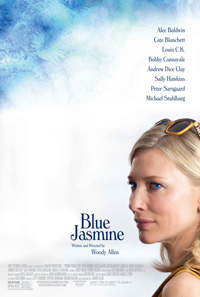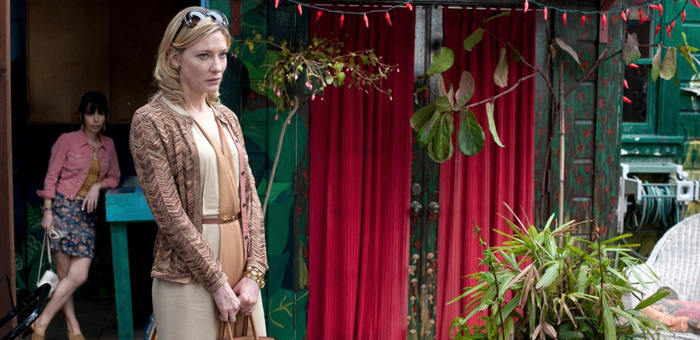Reviews
Blue Jasmine | Review
Blanchett Dubois: Allen Channels Tennessee For His Best Film in Years
 While few directors are as steadfastly perennial as Woody Allen, his constant output seems always to sag beneath his own greater titles of yore, and his own reputation is often his own worst enemy. With plenty of middling efforts and, every now and then, a critical knockout, Allen revisits the emotionally damaged female character study with Blue Jasmine, recalling some of those great vehicles he wrote for leading ladies like Mia Farrow and Diane Keaton decades ago. His latest shares a lot of DNA with the likes of Tennessee William’s A Streetcar Named Desire, but surpassing all potential squabbles, even all the trappings of Woody Allen himself, is an incredible central performance from Cate Blanchett.
While few directors are as steadfastly perennial as Woody Allen, his constant output seems always to sag beneath his own greater titles of yore, and his own reputation is often his own worst enemy. With plenty of middling efforts and, every now and then, a critical knockout, Allen revisits the emotionally damaged female character study with Blue Jasmine, recalling some of those great vehicles he wrote for leading ladies like Mia Farrow and Diane Keaton decades ago. His latest shares a lot of DNA with the likes of Tennessee William’s A Streetcar Named Desire, but surpassing all potential squabbles, even all the trappings of Woody Allen himself, is an incredible central performance from Cate Blanchett.
Jasmine French, whose real name is Jeannette (Blanchett), is a frayed socialite fleeing Park Avenue and a now hellish existence after her husband Hal (Alec Baldwin), an investment broker, was arrested in a Bernie Madoff inspired scandal. Historically at odds with her working class adopted sister, Ginger (Sally Hawkins), Jasmine is now depending on her sister’s charity in San Francisco, holed up in her trinket tinged apartment along with Ginger’s two children from a previous marriage to Augie (Andrew Dice Clay).
A pill popping, booze swindling mess, Jasmine’s main antagonists are her own awful memories. A recent nervous breakdown found her in the middle of streets mumbling to herself, and we’re treated to flashbacks that fill in the missing details. It turns out that Ginger and Augie had won the lottery and Hal had also embezzled their money, which seems to have been the main reason for her sibling’s divorce. Ginger’s new boyfriend, Chili (Bobby Cannavale) is like the younger version of Augie, and he’s immediately at odds with the pretentiously aloof Jasmine. Attempting to rebuild her life by going back to school in an addlepated scheme to first learn how to use a computer so she can then take online classes to get a license in interior decorating, Jasmine happens to meet an appropriately wealthy diplomat at a party (Peter Sarsgaard), while her sister also meets a potentially sweet admirer (Louis C.K.). But to their detriment, no one’s really being quite honest with each other.
Blanchett, who has played Blanche Dubois on stage (directed by Liv Ullmann, no less), retools a modern incarnation of that character here. When Allen strays into more obvious comedic scenarios, her Jasmine is reminiscent of embittered roles inhabited by Judy Davis from past Allen vehicles. However, there’s an anxious, unavoidable sadness threaded throughout the entirety of Blue Jasmine, and Blanchett, channeling Lauren Bacall, is so genuinely affecting that she may as well have been some tragically elegant Tennessee Williams’ victim transported into the midst of Allen. Even as we laugh, there’s a profound hopelessness about Jasmine’s life and her possibilities of redemption; she’s a lost creature and incredibly difficult to sympathize with.
An equally impressive supporting cast feels admirably inspired, from smarmy turns by Baldwin and Louis C.K., to the uncanny similarities of Andrew Dice Clay and Bobby Cannavale. As Jasmine’s adopted sister, Ginger, Sally Hawkins is an earthy, warm, befuddled type, and she’s an oddly fitting foil (including her American accent that makes her sound much throatier than expected), like Kim Hunter’s dowdy housewife to the larger than life Vivien Leigh. But it’s not all painful, as there are several incredibly hilarious sequences involving the pill popping Jasmine, who takes Xanax for her frequent stress headaches (washed down with Stoli), as she tries to explain herself drunkenly to her preadolescent nephews, fend off a horny employer, or lie through her teeth to snag a man that can drag her out of her dreary situation.
As is customary for Allen, this is a universe that consists of a self-involved circus of royal asses. While adroitly vague on certain details concerning the embezzlement backdrop that catalyzes the action, this is really the arrestingly simple window dressing (much like the Lana Turner-ish history of the family in his 1987 film, September) and Blue Jasmine’s stance as far as economy or capitalism is hardly important; Allen’s neurotic, anxiety riddled broken souls are as hopeless in any situation. If anything, this is just a more viciously uncomfortable essay on class differentials.
Flashing back and forth in time, as Jasmine recalls constantly the memories of a past, privileged life that haunt her, we’re treated to a revolving door of information to fill in the details. If it seems unfortunate that Hawkins’ Ginger is trapped in the casual, Allenesque archetype, her role, while potentially an unnecessary afterthought, is a much needed counterpart to Jasmine’s sinking stone. We’re not left with Stella trotting back to emotional abuse or Blanche trucked off to a loony bin, but Allen leaves us on a potentially more tragic note. Beyond the nagging irritation of Ginger’s complacency, Jasmine retreats further into her isolated madness, left to a modern world where there’s no such thing anymore as the kindness of strangers.






























